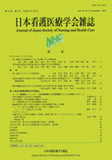Japanese
English
- 有料閲覧
- Abstract 文献概要
- 参考文献 Reference
抄録
<背景>2002年に米国でCKD(chronic kidney disease 慢性腎臓病)の概念が提唱され、世界で拡がりを見せている。CKDの治療目的は末期腎臓病への移行と心血管疾患合併の予防である。本研究では、CKDの生活指導に対する患者認識について年齢差・性差等を中心に検討し今後の生活支援への示唆を得ることを目的とした。
<方法と結果>2病院の腎臓病教室に参加した29人のCKD患者を対象とし自記式アンケート調査を実施し有効回答者27人(男性14人、女性13人)を分析対象とした。年齢の回答のあった30〜64歳を壮年期・中年期群(10人)、65〜74歳を前期高齢者群(7人)、75歳以上を後期高齢者群(6人)に分類した。生活指導を遵守できているという認識は壮年期・中年期群が後期高齢者群より有意に多かった(p<0.05)。蛋白制限の認識も壮年期・中年期群が後期高齢者群より有意に多かった(p<0.05)。
<結論>病院から個別に指導を受けている患者でも、年齢の違いによって生活指導の認識に有意差が見られたため、生活の自己管理の確立の援助のために、患者の年齢や理解度に合わせた指導が必要であると考えられた。
Abstract
Background: Since clinical entity of chronic kidney disease(CKD) was first introduced in 2002, the concept was widely accepted for clinical practice all over the world. Appropriate treatment of CKD is internationally recognized as very important to prevent cardiovascular disease and progression to endstage kidney disease. We sought to elucidate the differences in factors such as age and gender of patients concerning life style modification.
Methods and Results: Questionnaire analyses were performed to elucidate the self-recognition of management for daily life in 27 valid respondents(14 men and 13 women) of the 29 outpatients with CKD who answered questionnaires. We divided 23 patients(pts), who answered their ages, into 3subgroups, i.e. middle-age(10 pts), young-old(7 pts), and old-old(6 pts) groups. There were significantly(p<0.05) greater number of patients keeping lifestyle modification in middle-age group compared withyoung-old and old-old groups. Middle-age group recognized the importance of diet therapy such as protein restriction more than young-old and old-old groups(p<0.05).
Conclusions: Because significant differences were found in comprehension and adherence depending on age of pts, it would be important to take the difference in life style into considerations for better CKD nursing and management.
Copyright © 2012, Japan Society of Nursing and Health Care All rights reserved.


